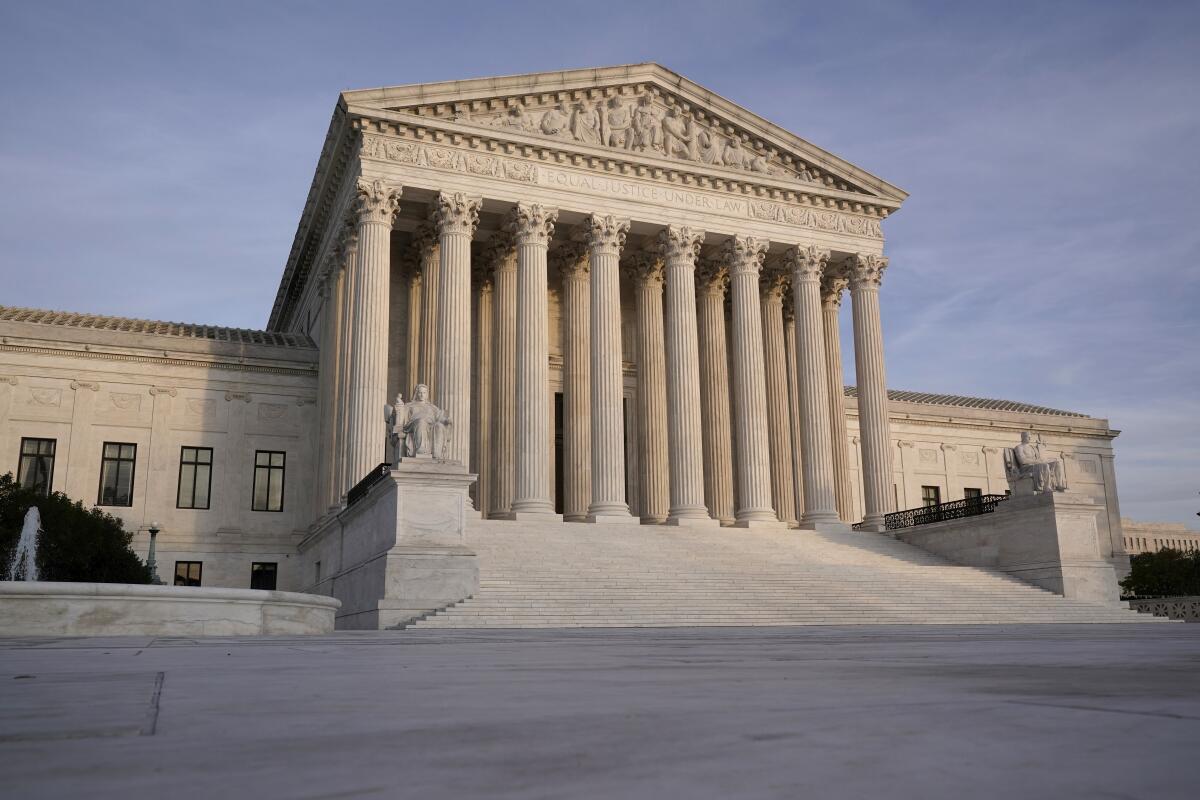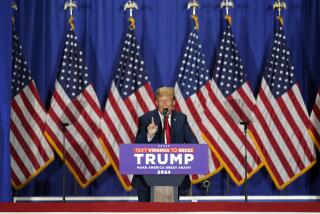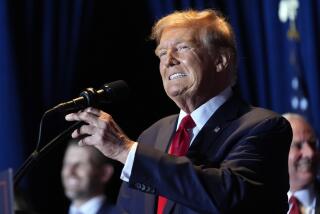With Trump appointees, Supreme Court delivers 9th Circuit another year of reversals

The Supreme Court’s favorite target again this year was the California-based U.S. 9th Circuit Court of Appeals, which saw 15 of 16 rulings overturned on review.
For decades, the high court’s conservatives have trained a skeptical eye on the historically liberal appeals court and regularly reversed its rulings, particularly on criminal law and the death penalty.
But by some estimates, this year saw the most Supreme Court reversals of 9th Circuit decisions since 1985. And the range of issues was broad, including immigration, religion, voting rights, property rights and class-action lawsuits.
In four years, President Trump appointed 10 judges to the appeals court, a sprawling Western jurisdiction that includes nine states and two U.S. territories. Presidents Obama and George W. Bush each named seven judges to the 9th Circuit in their eight years in the White House.
Trump’s 9th Circuit picks appeared to have played a significant role this year by pressing for internal review of rulings they didn’t like and joining sharp dissents that drew the interest of the Supreme Court.
“The more people who join the dissents, the more it gets the attention of the conservatives,” said one 9th Circuit judge, speaking on the condition of not being identified by name.
“This year was different,” another judge said. “This year was really different.”
When two owners of fruit-growing operations sued over a 1975 California state regulation that allowed union organizers to enter their property to speak to workers, they lost before a federal judge and the 9th Circuit.
Judge Richard A. Paez of Los Angeles, a Clinton appointee, said in a 2-1 decision that the state rule did not authorize “physical taking” of farmers’ property, as the lawsuit claimed, but rather temporary access to it.
Judge Sandra S. Ikuta of Los Angeles, a George W. Bush appointee, wrote a dissent arguing that the ruling was wrong and should be overturned. She said the state rule takes “an easement from the property owners” and gives it to union organizers, who are free to enter when they choose. In a dissent from the full court’s refusal to reconsider the panel’s decision, seven other 9th Circuit judges, six of them Trump appointees, agreed.
When the Supreme Court ruled 6 to 3 for the property owners last month, Chief Justice John G. Roberts Jr. cited Ikuta’s dissent. “The access regulation appropriates a right to invade the growers’ property,” he wrote in Cedar Point vs. Hassid. The high court was split along ideological grounds.
The same divide was on display in the justices’ 6-3 decision shielding big donors to conservative charities and nonprofits from having their names disclosed to the California attorney general.
The 9th Circuit, in a 3-0 decision, had upheld the state’s policy of checking donors as an anti-fraud measure, but Ikuta wrote a dissent, joined by four Republican appointees, two of them nominated by Trump. The dissent said the full appeals court should “correct this error.” She argued that experience had shown that conservative donors have suffered “harassment and abuse” when their names have been disclosed.
The Supreme Court agreed to review the ruling, and Roberts cited Ikuta’s dissent in his opinion reversing the 9th Circuit in Americans for Prosperity Foundation vs. Bonta.
“There is still a large cohort of liberal judges” on the 9th Circuit, said Ed Whelan, a conservative legal analyst in Washington, “but there are now many conservative appointees who are vigilant in calling them out.”
In total, 47 judges sit on the 9th Circuit — 24 appointed by Republicans going back to President Nixon, and 23 named by Democrats starting with President Carter.
Many of those judges work part time. Of the full-time jurists, 16 are Democratic and 13 are Republican appointees.
The size of the circuit — the nation’s largest — partly explains why its cases are often subject to Supreme Court review.
“The 9th Circuit is so vastly larger than any other circuit that it is inevitable they are going to take more 9th Circuit cases,” said Erwin Chemerinsky, dean of UC Berkeley’s law school.
Although this year’s 9th Circuit reversal rate was unusually high, the high court in fact overturned 80% of all the cases it reviewed, Chemerinsky noted.
Moreover, only a tiny percentage of appellate decisions are reviewed by the Supreme Court. Typically, the 9th Circuit hands down about 13,000 rulings a year.
Chemerinsky noted the Supreme Court overturned several 9th Circuit cases on immigration and habeas corpus, the legal vehicle for releasing someone from detention. “The 9th Circuit is historically more liberal on immigration and habeas cases,” he said.
Some reversals occurred in cases that were not ideological, however: The high court overturned a 9th Circuit decision by Republican appointees on what constitutes a robocall.
Though the Supreme Court split along ideological lines on property rights, voting rights and conservative donor cases from the 9th Circuit, the justices were unanimous in reversing the 9th Circuit in several immigration cases.
On June 1, they overturned a unique 9th Circuit rule set by the late liberal Judge Stephen Reinhardt. Over nearly 20 years, he had written that the testimony of a person seeking asylum based on a fear of persecution must be “deemed credible” unless an immigration judge made an “explicit” finding that they were not to be believed.
In one of his last opinions, Reinhardt approved of asylum for Ming Dai, a Chinese citizen who arrived in the U.S. on a tourist visa and applied for refugee status for himself and his family. He said they were fleeing China’s forced abortion policy.
Only later did immigration authorities learn that his wife and daughter had returned to China because they had good jobs and schooling there, but the husband had no job to return to.
An immigration judge had set out the full story and denied the asylum application, only to be be reversed in a 2-1 ruling by a 9th Circuit panel. The panel cited Reinhardt’s rule and noted that although evidence emerged casting doubt on Dai’s claims, there had been no “explicit” finding by an immigration judge so his story had to be accepted.
“Over the years, our circuit has manufactured misguided rules regarding the credibility of political asylum seekers,” Senior Judge Stephen S. Trott wrote in dissent. Later, 11 other appellate judges joined dissents arguing for scrapping this rule.
Last fall, Trump administration lawyers cited those dissents and urged the Supreme Court to hear the case. They noted the importance of the 9th Circuit in asylum cases. Because of its liberal reputation, “the 9th Circuit actually entertains more petitions for review than all of the other circuits combined,” the lawyers said.
In overturning the appeals court in a 9-0 ruling, Justice Neil M. Gorsuch began by noting that “at least 12 members of the 9th Circuit have objected to this judge-made rule.”
Justice Sonia Sotomayor delivered another 9-0 ruling holding that an immigrant arrested for an “unlawful entry” after having been deported years ago may not contest the basis of his original deportation. The 9th Circuit had said such a defendant may argue his deportation was “fundamentally unfair,” but “the statute does not permit such an exception,” Sotomayor said in U.S. vs. Palomar-Santiago.
The high court’s furthest-reaching immigration ruling did not originate with the 9th Circuit, but it nonetheless overturned a 9th Circuit decision.
At issue was whether the more than 400,000 immigrants who had been living and working in the U.S. under temporary protected status were eligible for long-term green cards. The Philadelphia-based 3rd Circuit said no, rejecting a green card for a Salvadoran couple who had entered the country illegally in the 1990s and had lived and worked in New Jersey ever since.
The 9th Circuit had taken the opposite view; Trump lawyers cited this split as a reason the high court should take up the New Jersey case. On June 7, Justice Elena Kagan spoke for the high court in ruling that the 3rd Circuit was right and the 9th Circuit wrong. To obtain lawful permanent status, the immigration law first “requires a lawful admission,” she said in Sanchez vs. Majorkas.
The 9th Circuit’s sole affirmance came in a significant case: By a 9-0 vote in NCAA vs. Alston, the justices agreed with the 9th Circuit that college sports authorities could be sued under antitrust laws for conspiring to make billions of dollars while insisting the star athletes go unpaid.
More to Read
Get the L.A. Times Politics newsletter
Deeply reported insights into legislation, politics and policy from Sacramento, Washington and beyond. In your inbox three times per week.
You may occasionally receive promotional content from the Los Angeles Times.








